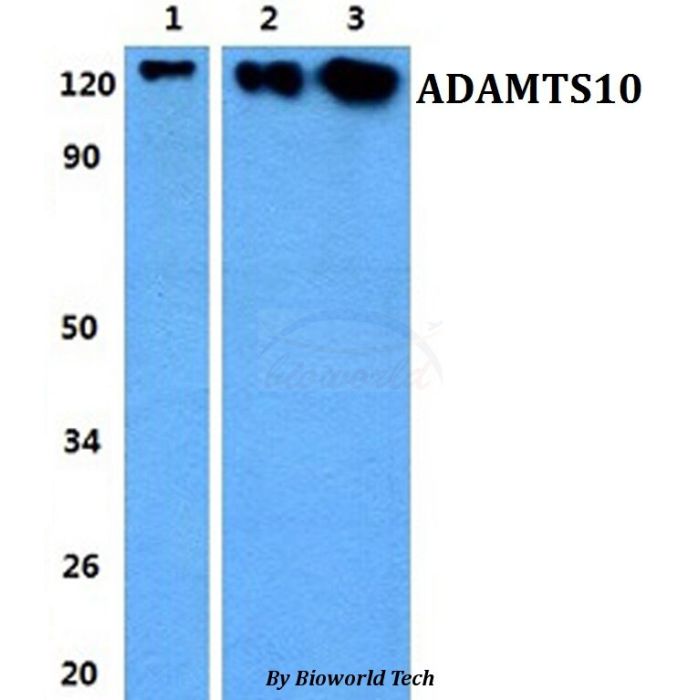ADAMTS10 polyclonal, anti-human, mouse, rat
€305.00
In stock
SKU
BS60809
Background:
ADAMTS (a disintegrin and metalloproteinase domain with Thrombospondin type-1 modules) is a family of zinc-dependent proteases that are implicated in a variety of normal and pathological conditions, including arthritis and cancer (1–3). Embryogenesis, morphological growth changes, inflammation, tumor invasion and metastasis involve the breakdown and remodeling of the extracellular matrix. This degradation is due to the family of enzymes known as the matrix metalloproteinases (MMPs), which are related to ADAMTS subtypes. ADAMTS protein family members contain an amino-terminal propeptide domain, a metalloproteinase domain, a disintegrin-like domain and a carboxy-terminus that contains a varying number of thrombospondin type-1 (TSP-1) motifs (1–3). ADAMTS genes are primarily expressed in fetal tissues, including the lung, kidney and liver (1–3). The human ADAMTS10 gene maps to chromosome 19p13.3 (4). The human ADAMTS19 gene maps to chromosome 5q31 (1,5).
Alternative Name:
A disintegrin and metalloproteinase with thrombospondin motifs 10 (EC:3.4.24.-), ADAM-TS 10, ADAM-TS10, ADAMTS-10, ADAMTS10
Application Dilution: WB: 1:500~1:1000, IHC: 1:50~1:200
Specificity: ADAMTS10 polyclonal antibody detects endogenous levels of ADAMTS10 protein.
Immunogen:
A synthetic peptide corresponding to residues in Human ADAMTS10.
MW: ~ 121 kDa
Swis Prot.: Q9H324
Purification & Purity:
The antibody was affinity-purified from rabbit antiserum by affinity-chromatography using epitope-specific immunogen and the purity is > 95% (by SDS-PAGE).
Format:
1 mg/ml in Phosphate buffered saline (PBS) with 0.05% sodium azide, approx. pH 7.3.
Storage:
Store at 4°C short term. Aliquot and store at -20°C long term. Avoid freeze-thaw cycles.
For research use only, not for use in diagnostic procedure.
ADAMTS (a disintegrin and metalloproteinase domain with Thrombospondin type-1 modules) is a family of zinc-dependent proteases that are implicated in a variety of normal and pathological conditions, including arthritis and cancer (1–3). Embryogenesis, morphological growth changes, inflammation, tumor invasion and metastasis involve the breakdown and remodeling of the extracellular matrix. This degradation is due to the family of enzymes known as the matrix metalloproteinases (MMPs), which are related to ADAMTS subtypes. ADAMTS protein family members contain an amino-terminal propeptide domain, a metalloproteinase domain, a disintegrin-like domain and a carboxy-terminus that contains a varying number of thrombospondin type-1 (TSP-1) motifs (1–3). ADAMTS genes are primarily expressed in fetal tissues, including the lung, kidney and liver (1–3). The human ADAMTS10 gene maps to chromosome 19p13.3 (4). The human ADAMTS19 gene maps to chromosome 5q31 (1,5).
Alternative Name:
A disintegrin and metalloproteinase with thrombospondin motifs 10 (EC:3.4.24.-), ADAM-TS 10, ADAM-TS10, ADAMTS-10, ADAMTS10
Application Dilution: WB: 1:500~1:1000, IHC: 1:50~1:200
Specificity: ADAMTS10 polyclonal antibody detects endogenous levels of ADAMTS10 protein.
Immunogen:
A synthetic peptide corresponding to residues in Human ADAMTS10.
MW: ~ 121 kDa
Swis Prot.: Q9H324
Purification & Purity:
The antibody was affinity-purified from rabbit antiserum by affinity-chromatography using epitope-specific immunogen and the purity is > 95% (by SDS-PAGE).
Format:
1 mg/ml in Phosphate buffered saline (PBS) with 0.05% sodium azide, approx. pH 7.3.
Storage:
Store at 4°C short term. Aliquot and store at -20°C long term. Avoid freeze-thaw cycles.
For research use only, not for use in diagnostic procedure.
| Is Featured? | No |
|---|
Write Your Own Review

